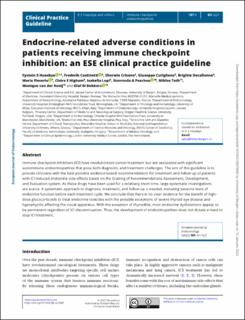Endocrine-related adverse conditions in patients receiving immune checkpoint inhibition: an ESE clinical practice guideline
Husebye, Eystein Sverre; Castinetti, Frederik; Criseno, Sherwin; Curigliano, Giuseppe; Decallonne, Brigitte; Fleseriu, Maria; Higham, Claire E.; Lupi, Isabella; Paschou, Stavroula A.; Toth, Miklos; van der Kooij, Monique; Dekkers, Olaf M.
Journal article, Peer reviewed
Published version

Åpne
Permanent lenke
https://hdl.handle.net/11250/3046174Utgivelsesdato
2022Metadata
Vis full innførselSamlinger
- Department of Clinical Science [2295]
- Registrations from Cristin [9531]
Sammendrag
Immune checkpoint inhibitors (ICI) have revolutionized cancer treatment but are associated with significant autoimmune endocrinopathies that pose both diagnostic and treatment challenges. The aim of this guideline is to provide clinicians with the best possible evidence-based recommendations for treatment and follow-up of patients with ICI-induced endocrine side-effects based on the Grading of Recommendations Assessment, Development, and Evaluation system. As these drugs have been used for a relatively short time, large systematic investigations are scarce. A systematic approach to diagnosis, treatment, and follow-up is needed, including baseline tests of endocrine function before each treatment cycle. We conclude that there is no clear evidence for the benefit of high-dose glucocorticoids to treat endocrine toxicities with the possible exceptions of severe thyroid eye disease and hypophysitis affecting the visual apparatus. With the exception of thyroiditis, most endocrine dysfunctions appear to be permanent regardless of ICI discontinuation. Thus, the development of endocrinopathies does not dictate a need to stop ICI treatment.
